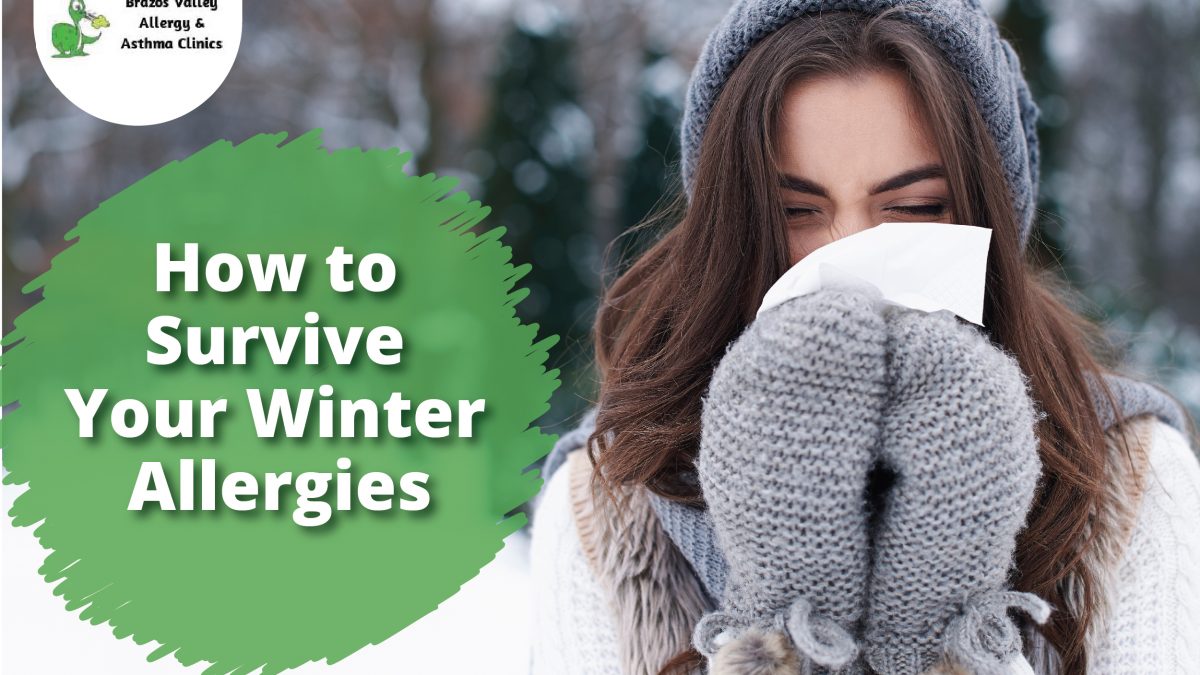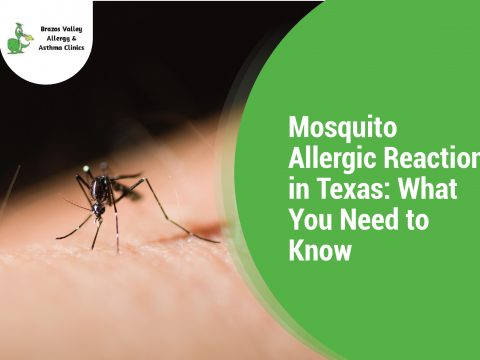- 979-485-9287
- office@bvallergy.com
-
 979-251-7804
979-251-7804
How to Survive Your Winter Allergies

Skin Allergies and How to Treat Them
November 12, 2021
Can Cold Weather Make Your Allergies Worse?
December 28, 2021Spring, summer, and fall bring allergy symptoms caused by tree, grass, and weed exposure. What may trigger allergy symptoms in the winter? Outdoor allergens are less likely to cause winter allergies; instead, exposure to indoor allergens triggers them.
Allergy season in winter is coming! Here, you can learn how to survive your winter allergies—including how to tell an allergy from a cold.
What are winter allergies?
Winter allergies are your typical seasonal allergy symptoms. However, since winter weather is often cold and harsh, you’re more likely to spend more time indoors—making you more susceptible to allergens.
Indoor allergens that trigger winter allergies include:
- Dust mites. Natural UV light is best for dust mites, but it’s hard to get proper sunlight in winter. Dust-mite colonies overgrow in winter without natural sunlight and can trigger allergies.
- Pet dander (protein-containing flakes of skin). In the winter, pet dander levels rise as pets are indoors more often, causing an increase in symptoms.
- Indoor mold. Mold can make your cold-weather allergies miserable. Even so, mold spores are well-known triggers of allergic rhinitis and asthma. Mold contamination can occur inside the home at any time of year, depending on humidity levels.
- Cockroach droppings. As winter approaches, cockroaches may be looking for shelter inside of your warm home that includes everything they need to survive.
By taking preventive measures, you can ease allergy symptoms. There is still hope for allergy relief even if your symptoms are at their worst.
Allergies vs. Cold
Allergies and colds have many different sources. Cold comes from a specific virus and is spread by an infected person. On the other hand, allergies trigger when an allergen or irritant releases a histamine reaction.
As a result, many people with allergies misdiagnose themselves as having a cold during the winter. The first step towards feeling better is a correct diagnosis. Here’s a breakdown of the differences between winter allergies and the common cold:
Winter Allergies Symptoms:
- Itchy, dry skin
- Sneezing
- Sore throat
- Itchy, swollen, and watery eyes
- Headaches
- Chest tightness
- Snot often appears clear in color
Common Cold Symptoms:
- Aches and chill
- Snot is often cloudy and discolored
- Sneezing
- Fever (although most people with colds do not have fever)
- Runny nose
- Sore throat
- Coughing
- Mucus dripping down your throat (post-nasal drip)
- Watery eyes
According to the Centers for Disease Control and Prevention, the nose produces clear mucus when viruses that cause colds enter the nose and air-filled pockets in the face (sinuses). A cold ends as well when your body fights off the infection. Nevertheless, if your symptoms are from winter allergies, you should find the cause.
Allergens can also enter the respiratory tract, which can cause allergies. Symptoms persist as long as you keep breathing in the allergens.
Do Allergies Get Worse in the Winter?
Allergic reactions depend on their triggers and how your body reacts. For example, if pollen worsens your symptoms, this could point towards a pollen allergy. Winter allergies can seem worse since the triggers are in your home and work environment, so it is more difficult to avoid them. In addition, dry air makes allergies worse. Indoor air dries out the skin and nasal passages. Thus, dry winter air exacerbates secondary infection risks like cracked skin and nosebleeds.
How to Survive Your Winter Allergies
Winter allergies arise from cold-weather lifestyles that make allergy symptoms worse. There are many ways to survive allergy symptoms throughout the year, whether you suffer from summer, spring, or winter allergies. Here are some tips for allergies:
- Clean, dust, and vacuum regularly with a vacuum that has a HEPA filter.
- Keep Away From Allergens. It is best to avoid allergy triggers in winter. Be sure to stay indoors when the wind stirs up damp leaves outside, and make sure to mop, sweep, and dust your home often to minimize indoor allergens.
- Wash Off allergens. The more often you wash your hands and face, the fewer allergens you carry and spread. If you suffer from severe allergy symptoms, take a shower; this removes your hair from allergens and allows you to change clothes that may contain the allergens. Moreover, hot baths may help relieve allergy symptoms like sinus congestion.
- Wash Your Bedding Often. Dust mites and pet dander thrive in bedrooms. To get rid of indoor allergens, wash your pillowcases, bedding, and sheets in hot water.
- Consider Using a Saline Solution. Saltwater irrigation can help soothe nasal congestion that comes with winter allergies. Try mixing one teaspoon of non-iodized salt into eight ounces of water in a squirt bottle.
- Add More Moisture. You can be dehydrated if you’re blowing your nose all the time and the thermostat is set high. Keep your fluid intake high by carrying a water bottle or eating more water-rich fruits and veggies. Furthermore, steam from hot drinks may also relieve nasal congestion.
- Add Moisture for the Air, Too. To combat dry air, use a humidifier. However, don’t allow it to turn into a rainforest. Indoor humidity is a delicate balance: Too little humidity may irritate the nose and throat; too much promotes mold growth. Humidity should not be below 30% or above 50%.
Allergy Medication Helps a Lot
If you can’t use over-the-counter or prescription allergy drugs properly, they won’t do you much good. Taking medication before symptoms occur makes it easier to survive winter allergies. Get the relief you need by following the directions on the label. You can also benefit from these long-term clinical treatments:
- Take over-the-counter (OTC) allergy medications. Examples include antihistamines and acetaminophen in Tylenol.
- Make use of a neti pot or nasal irrigation treatment.
- Nasal sprays can help. You can use steroid nasal sprays, such as fluticasone (Flonase) and triamcinolone (Nasacort).
- Consider allergy shots (immunotherapy). Ask your doctor first if you have severe, chronic allergy symptoms.
BVAllergy Can Help
Paul Jantzi has spent more than 13 years serving the south-central Texas region as an allergist. He is board-certified in allergy and immunology with prior specialty training in pediatrics and internal medicine. Schedule a meeting with him to learn more about immunotherapy and how it can help with your allergy symptoms.




